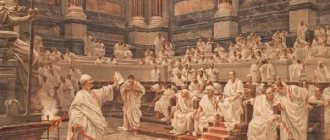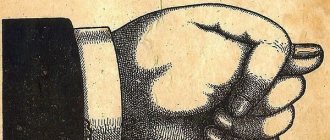People with public speaking skills always easily acquire the status of a leader among friends and colleagues, and quickly achieve success in many matters. It is impossible to imagine a politician who cannot speak logically and structuredly. Throughout human history, there have been people whose oratory skills reached an outstanding level. Such people can rightly be called great orators.
Orators of the ancient world
Oratory began its development in Ancient Greece, the secrets of which are still used today. There were already quite a lot of people who could speak beautifully at that time. The list of outstanding figures includes such great orators as Pericles, Cicero, Lysias, Demosthenes, Aristotle and others. In particular, Lysias and Demosthenes should be highlighted, since it was these great orators that all subsequent generations looked up to.
Lysias was an excellent judicial orator of ancient times, whose speeches were always distinguished by originality, expressiveness and uniqueness. He thought through and carefully worked out every detail of his text. Irony was often present in the speeches of this speaker, which aroused great sympathy among the audience. At the same time, the speech was always brief and did not contain anything superfluous. Lysias's speech is considered a standard for orators around the world. Many speakers who spoke in court took their cue from him, borrowing his style of eloquence.
Fox
Another great orator whom many public figures looked up to was Demosthenes. This man is considered a genius, because in order to become a speaker, he had to change a lot in himself. From birth, Demosthenes had a weak voice and short breathing.
Demosthenes
Through long and rigorous training using a variety of techniques, he was able to achieve brilliant results and became one of the best speakers of all time. One could only envy his diction, beautiful and understandable speech. The speeches of this famous speaker were bright, his expressions were short and concise.
Abraham Lincoln
The trend is that many of the greatest speakers have achieved success by practicing on their own. They turned art into their life’s work, without stopping their development and continuing to improve. The same applies to Abraham Lincoln, the sixteenth President of the United States of America, whose family's financial situation allowed him to sit in school for only a year. Nevertheless, the boy took on his own education and eventually became one of the most outstanding speakers the world remembers.
Famous speakers abroad
There are many famous and great speakers in foreign countries who were distinguished by their excellent ability to structure their speech during speeches so that people did not doubt their beliefs. The most outstanding personalities include two prominent political figures:
Adolf Gitler
Despite all his devilish essence, this man was a powerful speaker who, while speaking, always kept the masses in suspense and full attention. In his speeches, he used sharp hand gestures, spoke emotionally and even rudely. In his speeches there was such a feature as the use of long pauses in order to emphasize something important and basic.
He prepared his speech in advance, writing everything down on paper. Hitler was not known for his restraint, so he often gave vent to his emotions, splashing them out on his listeners. People were attracted by the fact that he sometimes spoke slowly and sometimes quickly. Therefore, he used this technique in every speech. Despite the fact that his ideas were often evil and wrong, the people supported him. In this regard, Hitler is called the speaker of evil. Despite all the dark side of this man, he always ends up on the list - “The Greatest Speakers of the 20-21st Century”.
Winston Churchill
This politician always prepared in advance for each of his speeches, even thinking through his facial expressions and gestures. He worked out the text so that it was perfect. This man was distinguished by charisma and often used humor in his speech.
He was so inspired by his ideas that he could infect the entire people with them. When composing the text, he actively used such artistic techniques as metaphor and comparison. During the communication process, Churchill tried to be calm and behave naturally. From birth he had a speech defect such as a lisp, however, over time he managed to get rid of it.
Gorgias of Leontina
One of the most famous orators of antiquity, Gorgias of Leontina, belonged to the Sophists. He was not only a practitioner - a skilled rhetorician who taught young men from wealthy families to make speeches and conduct discussions. Gorgias was also a theorist. Traveling throughout Hellas, he became famous for his successful performances. He convinced the Athenians to provide military assistance to their compatriots, and during another speech, to unite against the barbarians. This speech, delivered at Olympia, made Gorgias a celebrity. Gorgias paid great attention to style. He developed and used “Gorgian figures” - rhetorical techniques that gave poetic expressiveness to speech. For his time, Gorgias was a great innovator: he used metaphors and comparisons, symmetrical construction of phrases, and identical sentence endings to enhance persuasiveness. Little direct advice from Gorgias has survived to this day: “Refute serious arguments with a joke, jokes with seriousness.” As you can see, the Hellenes no longer liked too serious speakers who were not able to decorate their speech with a good joke.
Russian speakers
In Russia, too, there have always been famous outstanding speakers, which include such famous personalities as Kony, Trotsky, Zhirinovsky, Putin and others.
Anatoly Fedorovich Koni
Anatoly Fedorovich was engaged in legal and social activities at the end of the 19th and beginning of the 20th century. He urged everyone to maintain morality in the legal process. Kony's speech was always lively and dynamic, never sounding monotonous.
He believed that speakers speaking in court should be fair and defend the truth. In his speeches, Kony was not dry, but gave free rein to his emotions. But he knew how to combine facts with feelings so that the text had a positive impact on the minds of the judges. This speaker's defense speech left no doubt that the verdict would be pronounced in his favor.
Anatoly Fedorovich Koni had high individual and socially significant moral qualities, followed the rules of honor, always delivered his speech clearly, without using terminology unknown to others, and was fluent in eloquence.
Lev Davidovich Trotsky
Many people said that Lev Davidovich is the best speaker of the 20th century. He had a powerful timbre of his voice, his words were pronounced clearly and understandably. He was an intelligent and active man who was feared by many opponents. The great orator himself did not feel fear of a single person, so he said everything to his face, without hiding anything.
Trotsky's speech was always structured consistently, logically and briefly. He was good at convincing people, so he had a large number of associates. His gift of eloquence was clearly visible during political speeches.
Vladimir Ilyich Lenin
Great orators of the 20th century - this list should undoubtedly include Lenin. Vladimir Ilyich gave speeches that were accessible and understandable to every representative of the people. He had a great sense of people's mood, so he could entice them with almost any idea. Most of all, he used dialogue, communicating with people, answering their questions.
His speech was distinguished by brevity and specificity. He also used directing hand gestures, which only increased his influence on people. Lenin had a charisma that attracted all listening people. His phrases became catchphrases, they were used by other people and published in publications.
Vladimir Vladimirovich Putin
Vladimir Vladimirovich is perhaps the most famous Russian political speaker of our time. He speaks easily, using a bit of humor in his speech. His speeches are always well thought out and contain nothing superfluous. The gestures of the hands are smooth, which does not distract people’s attention at all, and once again emphasizes confidence.
This politician is distinguished by restraint and calmness when communicating with people or colleagues, not allowing himself to say a harsh or rude word. He always answers people’s questions clearly, as he is well versed in many areas of life.
Vladimir Volfovich Zhirinovsky
Vladimir Volfovich is distinguished by the fact that his speech is always accompanied by emotional overtones, it is unpredictable and even sometimes has some aggressiveness. His performances are more like a show. He often puts pressure on his interlocutor with his words and uses energetic gestures.
Zhirinovsky has strong charisma. But he is not only a great orator, but a very smart and fair politician. Vladimir Volfovich can easily start a dispute, as he understands any topic. He is not distinguished by restraint, he always says what he thinks, expresses his emotions, and can often allow himself to say too much to focus attention on his person.
All the best speakers in the world mentioned above are not the entire list of outstanding masters of eloquence (let’s not forget about such great speakers as James Humes, Abraham Lincoln, Steve Jobs, etc.). It is difficult to answer the question of who is the best speaker of all time. Some had the gift of eloquence from birth, while others went a long way, coping with their speech deficiencies and acquiring oratory skills, becoming great. But one thing can be said for everyone: thanks to their wonderful eloquence, they were able to become famous figures in public and political life.
Demosthenes
A little later, Demosthenes lived - he is rightly called the greatest Greek orator. Demosthenes attracted attention with his appearances in court: the young man's guardians squandered his father's fortune, and Demosthenes sought the return of the funds. He managed to regain only a small part, but his skillful speeches at court hearings did not go unnoticed. Demosthenes dreamed of glory, he studied with the outstanding Iseus of Athens, and took Pericles, the “father of Athenian democracy,” a commander and master of eloquence, as an example for himself. During the time of Demosthenes, the Athenian public was spoiled by public speaking, the listeners were sophisticated. They expected from public speakers not only the beauty of style and deep content of speeches, but also a beautiful, almost theatrical presentation: staged gestures, facial expressions. By nature, Demosthenes could not boast of outstanding characteristics: he had short breathing and a weak voice. In addition, he had a habit of nervously twitching his shoulder. To overcome these shortcomings, Demosthenes used a technique well known to everyone who taught diction: he spoke by putting pebbles in his mouth. To make his voice stronger, he rehearsed speeches on the seashore: the noise of the sea replaced the noise of the crowd. And to develop breathing, I read poets while climbing steep paths. He practiced facial expressions in front of the mirror. As a result, with perseverance he overcame his shortcomings, and although Demosthenes’s very first speeches were not successful, he did not give up and subsequently made a brilliant political career.
Winston Churchill
Churchill was a journalist, writer and Nobel Prize winner in literature, but we remember him as the Prime Minister of Great Britain. It was he who held this responsible post for most of the period of World War II. Winston Churchill went down in history as an unsurpassed orator. Churchill attached great importance to the emotionality of speech and the speaker's devotion to his own ideas: how can you convince others if you yourself do not believe your own words? But he attached no less importance to technology. Churchill valued simplicity and rejected anything too complicated or pretentious that would prevent his listeners from grasping the essence. He believed that “short words are the best,” and you can learn from him to simplify your own speeches, making them clear.
Marcus Tullius Cicero
Greece became the birthplace of oratory; it gave the world many outstanding speakers. This was required by the very way of life of the Hellenes. But the baton of eloquence was successfully picked up by Rome, which borrowed a lot from Hellas. One of the outstanding rhetoricians of Rome was Marcus Tullius Cicero. Cicero owes his dizzying career solely to his own perseverance and oratorical talent. He came from a modest, humble family and from birth had very modest opportunities to become an influential person. However, thanks to his oratory talent, he entered the Senate and became consul. You can learn from Cicero yourself: he left a large literary legacy that has survived to this day, and his letters formed the basis of European epistolary literature. Before becoming famous and gaining recognition, Cicero studied Greek poets and prose writers - he had an excellent command of the Greek language. His teachers were great rhetoricians: Mark Antony and Lucius Licinius Crassus. Since in the time of Cicero it was necessary to know Roman law well, the future consul studied it with Quintus Mucius Scaevola, the most popular lawyer of his time. Cicero's first success came with the speech “In Defense of Quinctius” - it was written and delivered to return illegally seized property. His second famous speech also defended the wrongfully offended: a native of the province of Russia, who was unjustly accused of parricide. In this case, Cicero showed himself not only to be a brilliant orator, but also a real detective: he took the trouble to personally visit the crime scene and investigate the circumstances. Cicero's speeches were structured according to all the rules of rhetoric of that time: they included direct appeals on behalf of the accused and a refutation of the prosecution's arguments.
What is modern oratory and rhetoric?
Today, modern general rhetoric, based on such disciplines as philosophy, psychology, aesthetics, ethics and linguistics, is able to form the broadest oratorical competence, which can ensure the level of oratorical skill in all forms of speech communication. If logic is responsible for the coherence and thoroughness of speech, and grammar demonstrates the correct use of words, then rhetoric contributes to the consistent and accurate presentation of thoughts. Thus, the goal of modern rhetoric is to teach a person, during any communication, to successfully “manage” the process of transmitting his message, as well as the process of successfully perceiving this message on the part of the listener.
The oratory skill that a person acquires after modern rhetorical training is his most effective calling card, which can reliably guarantee a successful professional and personal future.
Today, rhetoric is already a scientifically based theory and practice of modern oratory.
It is based on a thoughtful, always targeted, and therefore appropriate and effective both in its objectives and in the manner of presentation, presentation to the audience. Modern speeches, if they are created according to the laws of oratory, allow the authors - modern speakers - to become noticeable, memorable and recognizable, without attracting additional funds. Whether it's money or connections.
As he said: “Eloquence is the worker of persuasion.” Indeed, the skill of persuading clients is sometimes very conducive to career advancement.
It should be remembered that public speaking is not an innate talent; it can and should be trained and developed. The science of “rhetoric” is the same science as physics and chemistry, and with some effort, anyone can master it.
Rhetoric in the modern world: the “Iron Lady” Margaret Thatcher






